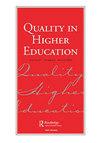重要的问题:使用Q方法来确定学生在模块级经验中的优先级
IF 1.1
Q3 EDUCATION & EDUCATIONAL RESEARCH
引用次数: 0
摘要
学生对评估调查的参与度一直在下降,降低了质量保证和增强数据的可靠性和可用性。据学生们报告,其中一个原因是,他们认为调查问题与他们的日常经历和关注点相关性较低。标准化调查工具提供的统一问题很少能反映具有广泛教育经历的多样化学生群体的需求。本文借鉴了一个项目的发现,该项目通过让学生参与调查问题的开发,探索了学生在模块级经验中的优先级。Q方法用于识别具有相似观点的学生群体,并探索有关模块体验的关键因素和思维模式。该项目的研究结果表明,三个不同的群体反映了学生大学旅程的不同阶段,他们的成熟程度和认知参与程度。文章反映了研究结果对质量保证过程、教学和学生支持的影响。本文章由计算机程序翻译,如有差异,请以英文原文为准。
Questions that matter: using Q methodology to identify student priorities in module level experience
Abstract Student engagement with evaluation surveys has been declining, reducing the reliability and usability of the data for quality assurance and enhancement. One of the reasons for that, as reported by students, is the perceived low relevance of survey questions to their daily experiences and concerns. Uniform questions, provided by standardised survey instruments, rarely capture the needs of a diverse student population with wide-ranging educational experiences. This article draws on findings from a project that explored student priorities in the module level experience by involving them in the development of survey questions. Q methodology was utilised to identify groups of students with similar views and to explore key factors and patterns of thoughts about module experience. The project findings are indicative of three distinctive groups that reflect different stages of the student university journey, their level of maturity and cognitive engagement. The article reflects on the implications of the findings for quality assurance processes, teaching and student support.
求助全文
通过发布文献求助,成功后即可免费获取论文全文。
去求助
来源期刊

Quality in Higher Education
EDUCATION & EDUCATIONAL RESEARCH-
CiteScore
3.30
自引率
14.30%
发文量
32
期刊介绍:
Quality in Higher Education is aimed at those interested in the theory, practice and policies relating to the control, management and improvement of quality in higher education. The journal is receptive to critical, phenomenological as well as positivistic studies. The journal would like to publish more studies that use hermeneutic, semiotic, ethnographic or dialectical research as well as the more traditional studies based on quantitative surveys and in-depth interviews and focus groups. Papers that have empirical research content are particularly welcome. The editor especially wishes to encourage papers on: reported research results, especially where these assess the impact of quality assurance systems, procedures and methodologies; theoretical analyses of quality and quality initiatives in higher education; comparative evaluation and international aspects of practice and policy with a view to identifying transportable methods, systems and good practice; quality assurance and standards monitoring of transnational higher education; the nature and impact and student feedback; improvements in learning and teaching that impact on quality and standards; links between quality assurance and employability; evaluations of the impact of quality procedures at national level, backed up by research evidence.
 求助内容:
求助内容: 应助结果提醒方式:
应助结果提醒方式:


